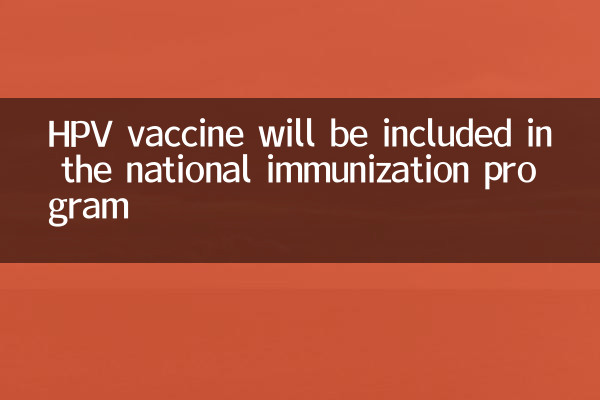HPV vaccine will be included in the national immunization program
Recently, the National Health Commission released a major news,HPV vaccine will be officially included in the national immunization program, This means that women of appropriate age will have the opportunity to receive HPV vaccine for free, further reducing the incidence of cervical cancer. This policy has aroused widespread attention and heated discussions from all walks of life.
HPV (human papillomavirus) vaccine is an important means to prevent cervical cancer. According to statistics, there are about 570,000 new cases of cervical cancer worldwide every year, of which China accounts for nearly one-third. The popularization of HPV vaccine will significantly reduce the burden of cervical cancer and related diseases.

The following are the hot topics and hot content on HPV vaccines across the Internet in the past 10 days:
| topic | Popularity index | Main discussion points |
|---|---|---|
| HPV vaccine free vaccination policy | 95 | Policy covers the population, implementation time, and vaccination process |
| HPV vaccine safety | 88 | Side effects of vaccines, contraindications for vaccination, long-term effects |
| Cervical cancer prevention knowledge | 82 | HPV infection pathway, screening importance, early symptoms |
| Comparison of different HPV vaccines | 75 | Differences in bivalent, quadrivalent and nine-valent vaccines, vaccination age |
| Male vaccination for HPV | 65 | Male infection risk, prevention value, international experience |
Main content of the policy:
According to the notice issued by the National Health Commission, HPV vaccines in the immunization program will be implemented in stages:
| stage | time | Covering the crowd | Scope of implementation |
|---|---|---|---|
| Pilot phase | 2023 Q4 | Female students aged 13-15 | The first batch of 15 provinces and cities |
| Expansion phase | First half of 2024 | Women aged 13-18 | Nationwide |
| Fully implemented | Second half of 2024 | Women aged 9-45 | Nationwide |
Expert interpretation:
Wang Huaqing, chief expert of the immunization program of the Chinese Center for Disease Control and Prevention, said: "Incorporating HPV vaccines into the national immunization program is a major improvement in China's public health. This policy is expected to cause a significant decline in the incidence of cervical cancer in my country in the next 10-15 years."
Professor Li Nan, an expert on gynecology at Peking University Cancer Hospital, pointed out: "The best age for vaccination for HPV vaccine is 9-14 years old, and the best vaccination effect is before sexual intercourse begins. But even women who have already had sex, vaccination still has a protective effect."
Public Response:
On social media, this policy has received widespread praise. The number of readings on Weibo topic #HPV Vaccine Free Vaccination# has exceeded 500 million, and the number of discussions has reached 1.2 million. Many netizens said: "I finally waited for this day!" "I hope it can be implemented in various places as soon as possible." "This is very important for protecting women's health."
However, some netizens expressed concerns about the supply of vaccines. In response, the National Health Commission responded that it had reached an agreement with several vaccine manufacturers to ensure adequate vaccine supply.
International comparison:
| Country/Region | HPV vaccine policy | Implementation time | Vaccination rate |
|---|---|---|---|
| Australia | Free vaccination for students aged 12-13 | 2007 | More than 80% |
| U.K. | Free vaccination for girls aged 12-13 | 2008 | 85% |
| USA | Routine vaccination for children aged 11-12 | 2006 | 60% |
| Hong Kong, China | Free vaccination for primary school girls | 2019 | 90% |
Future Outlook:
With the inclusion of HPV vaccines in the national immunization plan, it is expected that by 2025, the HPV vaccination rate of women of appropriate age in my country will increase significantly. Experts suggest that in addition to vaccination, regular cervical cancer screening is equally important, and a two-pronged approach can prevent cervical cancer to the greatest extent.
The National Health Commission stated that the next step will be to strengthen popular science publicity for HPV vaccination to eliminate public doubts; at the same time, improve the vaccine supply and vaccination service network to ensure the smooth implementation of the policy. This people-friendly policy will bring revolutionary changes to the health of Chinese women.